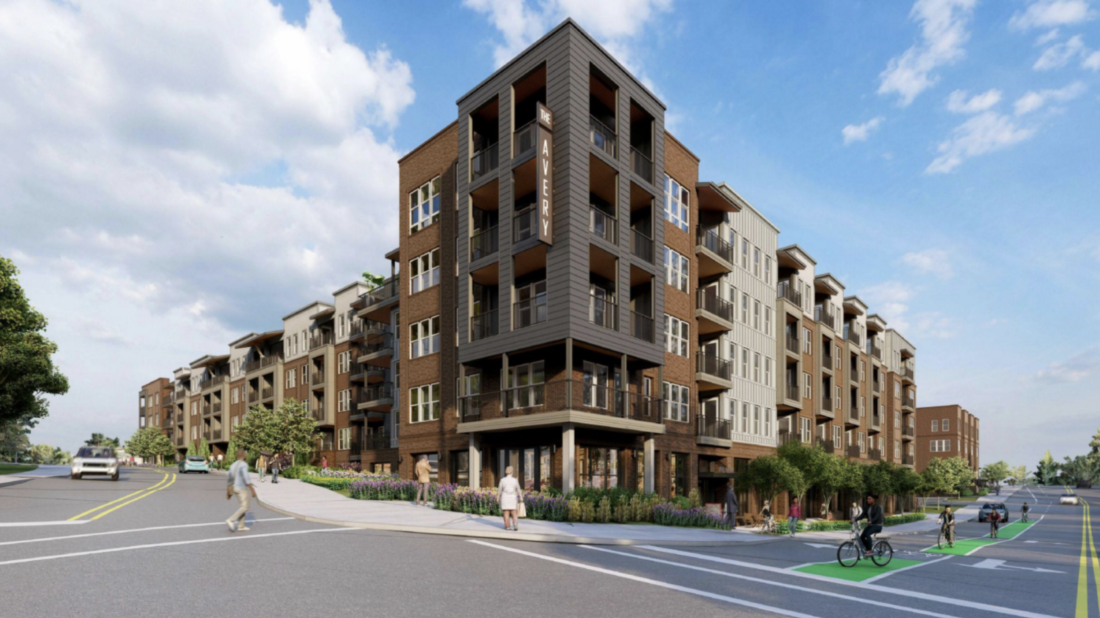If Asheville City Council says no to a rezoning request for a given piece of land, a developer must usually wait a year before returning with a new proposal for the property. Delray at Hilliard Avenue LLC, owner of a site at 363 Hilliard Ave., waited all of two weeks.
Employing a previously unused power that Mayor Esther Manheimer claimed under Rule 19(l) of Council’s Rules of Procedure, Council voted unanimously March 8 to rescind a Feb. 22 denial of conditional zoning for a proposed 187-unit housing development at 363 Hilliard Ave. Members then voted 6-1 to approve an updated request that increased the number of affordable units offered by the developer.
Vice Mayor Sheneika Smith was the sole Council member against the updated conditional zoning but did not provide an explanation for her vote.
The original zoning request was denied in a 5-2 vote, with Council members Sandra Kilgore and Antanette Mosley in favor. The updated proposal boosted the number of units offered as affordable to residents making 80% of the area median income ($42,100 for an individual or $60,100 for a family of four) from nine to roughly 18; the number of units that would accept housing vouchers rose from five to nine. The proposal also added a new condition requiring the development to comply with any additional traffic mitigation measures mandated by the N.C. Department of Transportation.
The unusual process was noted by Asheville City Council candidate Nina Tovish, who spoke during public comment ahead of the vote. While the decision to rescind the vote was within the scope of Council’s policies, she said, the move lacked transparency and set the stage for further use of the rule.
“It’s rather unprecedented. I don’t think I’ve seen this happen before. And I’m curious what the public is to make of this rapid turnaround,” Tovish said. “What was the process? What were the nature of conversations that took place? Are there any documentations of those conversations, just so that the public can have a transparent view into the exchanges that took place between Council members and the applicant to understand how this process went forward?”
“I think that’s a fair question. I don’t recall us doing this before,” Manheimer responded. She noted that the request to revisit Council’s decision was made by the applicant through communications with City Attorney Brad Branham and that those documents could be accessed through public records requests.
(The city’s former public records officer, Leslie Coty, left her post Feb. 11, and as of press time, Asheville does not employ a full-time staffer to facilitate requests. Many public records requests, such as Xpress’ ask for documents related to the 2021 Council retreat, have taken months to fulfill.)
Council appoints Reparations Commission members
Eight months after the timeline established by City Manager Debra Campbell, Council approved five appointments for the Community Reparations Commission, which is tasked with establishing short-, medium- and long-term recommendations to address disparities within Asheville’s Black community.
The appointed members include Dewana Little, executive director of the YMI Cultural Center; Dwight Mullen, a retired UNC Asheville political science professor and founder of the State of Black Asheville research project; CiCi Weston, executive director of the Christine W. Avery Learning Center; Tamarie Macon, assistant professor for the Public Health Leadership Program and director of community initiatives for the Mountain Area Health Education Center; and Joyce Harrison, retired regional director at Self-Help Credit Union.
The appointees represent the commission’s five impact focus areas: criminal justice, economic development, education, health care and housing, respectively. The Buncombe County Board of Commissioners is scheduled to make its own five appointments Tuesday, March 15, according to county spokesperson Kassi Day.
Also announced were 15 commission members who represent historically Black neighborhoods impacted by urban renewal. Those members were selected through an independent neighborhood nomination process, with no oversight from city or county government. Neighborhood appointees include DeWayne Barton, MZ Yehudah, Keith Young, Glenda McDowell, Bernard V. Oliphant, Renata Conyers, Norma S. Baynes, Bobbette K. Mays, Midred Nance Carson, Roy Harris, Thomas Priester, Kimberly Jones, Shaunda Jackson, Anglea Young and Aleesha Ballard.




Maybe Esther doesn’t know the public records person left in February, or maybe she does and hopes no one ever gets hired in that position so the city can continue to fail in providing information requests from the press, public and everyone else. The lack of transparency in Asheville is mindboggling.
Asheville-City of Hidden Agendas…couldn’t that be a tourist attraction?